One of the simplest yet most effective ways to stay safe online is by keeping your software and devices up-to-date.
Bangalore, India, February 6, 2024: On Safer Internet Day, Fortinet® highlights the growing challenge of cybercrime, now a major global concern. In the face of sophisticated attacks and new types of online scams, staying vigilant is more important than ever. The National Cybercrime Portal of India recorded over 1.5 million cases in 2023, a clear call for heightened internet safety measures.
Become cyber-aware and implement these best practices to protect yourself against cybercrime.
#1: Improve Your Password Practices
It’s increasingly common for attackers to access and use real user credentials. To protect your online accounts, create unique passwords for each one. Mix up letters (both uppercase and lowercase), numbers, and symbols, and aim for lengths over 10 characters. Avoid predictable combinations. Using a password manager can help manage these complex passwords effectively.
#2: Update your software and devices regularly.
One of the simplest yet most effective ways to stay safe online is by keeping your software and devices up-to-date. These updates often include fixes for security vulnerabilities. Most device and software makers notify you when updates are available, making it easy to stay protected. Make sure you have an antivirus agent running on all devices for added protection against cyber threats.
#3: Exercise Caution with Links
Human error, like clicking on suspicious links in emails or messages, accounts for a large percentage of cyber incidents. Always check a link before clicking on it; look for odd spellings or unusual characters in the URL. When in doubt, verify the authenticity of the website through a reliable online search.
#4: Be wary of offers that seem too good to be true.
Online scams often lure in victims with offers of highly sought-after items at very low prices, especially during holiday seasons. If a deal seems unusually favourable, it might be a trap. Stick to well-known and trusted online shopping sites, and use credit cards for better fraud protection.
#5: Use a secure connection.
A secure connection protects your data and helps keep your information safe. Look out for a small lock symbol to the left of the URL; this confirms you have a secure connection to the site you are visiting. Before doing a banking or financial transaction, check the certificate on the website. Ensure the site has a Secure Socket Layer (SSL) certificate so that all data entered and transmitted is encrypted and secure. Avoid connecting to a public wi-fi network unless you have a secure VPN connection on your device.
Vishak Raman, Vice President of Sales, India, SAARC, SEAHK, and ANZ at Fortinet, said, “Cybercrime presents a significant risk to this new digital world, impacting everyone, from individuals to businesses to critical infrastructure and governments. The potential impact goes well beyond financial loss and damages; cybercrime creates an enormous barrier to digital trust and undermines the benefits of our new digital world. Fortinet is proud to be one of the founding members of the World Economic Forum Centre for Cybersecurity, an active contributor to its Partnership against Cybercrime community, and a founding member in the development of the new Cybercrime Atlas. We are committed to working with private and public stakeholders and law enforcement agencies to help make our digital world a safer place.”
Do Follow: CIO News LinkedIn Account | CIO News Facebook | CIO News Youtube | CIO News Twitter
About us:
CIO News, a proprietary of Mercadeo, produces award-winning content and resources for IT leaders across any industry through print articles and recorded video interviews on topics in the technology sector such as Digital Transformation, Artificial Intelligence (AI), Machine Learning (ML), Cloud, Robotics, Cyber-security, Data, Analytics, SOC, SASE, among other technology topics.






